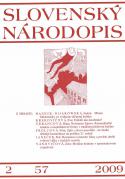Folklór ako konštrukt?
Folklore as a construct?
Author(s): Eva KrekovičováSubject(s): Anthropology
Published by: Ústav etnológie a sociálnej antropológie Slovenskej akadémie vied
Keywords: theory and methodology of ethnology; folkloristics; construct; folklore; narrativity; purism;
Summary/Abstract: In her contribution, the writer focuses on terminology and on theoretical and methodological issues contained in research studies conducted at the turn of the millennia and dealing with the specification of folkloristics, as part of ethnology and ethnomusicology, in relation to ethnography. She concentrates on the following areas. First, while treating the term ”construct” (”cultural constructions”) and its use in relations between ethnography and ethnology, she points out that the specification of the term from aspects of ethnology is still rather ambiguous; Second, there is an urgent need of interconnecting the ethnological research done in Central and Eastern Europe with that in other parts of Europe. In order to demonstrate the inspiring power of such an approach to future research, she uses the creation of folk culture and folklore ”constructs” during the 19th and 20th centuries in the all-European context. Third, there is folklore as a manifestation of cultural heritage. Here the author suggests that the inquiry into traditional folklore should be separated from other parallel forms of communication. In her opinion, ”narrativity” in its various forms (”oral history”, rumour, ”modern legends”, narratives disseminating conspiracy theories, etc.) should be studied as a specific subject matter. She also refers to the blurred boundaries of folkloristics which, as a science devoted to cultural heritage, studies more or less historically closed areas of culture and everyday way of life. What she requires is to continue discussions about folklore regarded as a specific (art) ”style” with its own ”poetics” and ”language”. The reason is a relatively wide range of genres and forms to be found on the divide between folklore and other areas at which both ethnology and anthropology aim their own inquires. Fourth, there is the phenomenon of ”purism” to be dealt with as an approach restricting methods of field research and in relation to art forms of material and non-material cultural heritage. It should become a subject of discussions about the past and present (which, does not concern only folklore).
Journal: Slovenský národopis
- Issue Year: 57/2009
- Issue No: 2
- Page Range: 162 - 174
- Page Count: 13
- Language: Slovak

